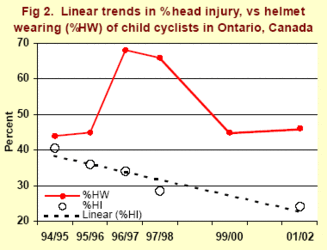If you want to move it onto a debate on the scientific evidence and its merits then we can have a reasoned debate but as long as the anti-helmet side sticks to its "they are only their for stationary fall" and "show me proof they work" arguments (as they have here)
I'm really confused. The goal of evidence is to prove or disprove that they work. Why are we not allowed to consider the option that they don't?
A one-sided fact!? Brilliant.then reasoned debate will be impossible because the anti-helmet side is arguing from only 1 sided facts.
I'm not going to get into a big lecture on the uses and abuses of stats. In fact I've told a bit of a fib above. Statistics don't prove or disprove anything - they allow us to accept or reject hypotheses with a specified level of confidence. So, taking smoking for example, the evidence has built up over the years that they cause cancer. We can state this with a very, very high degree of confidence, but it's still not absolute proof. With cycle helmets, the data to support the hypothesis that helmets reduce KSIs is much much weaker.
The main difficulty with drawing conclusions from data gathered from 'the real world' is that we have to be very careful that we don't attribute the the wrong cause to the observed effect or introduce implicit biases in the way we collect data. Throwing the maths at bad data will give bad results and give rise to bad conclusions. This kind of thing is rife in the helmet debate - for example by considering the reduction in deaths due to helment compulsion in isolation from any reduction in cycling numbers, or extrapolating injury numbers from a specific age group across the population.
None of this is particularly easy, but my frustration with the whole helmet debate (and unfortunately the policies of many pressure groups) is that they don't want to engage in the gathering and analysis of impartial, unbiased evidence because it's difficult to soundbite and there's a chance it might not fit with their established predjudices.
OK, it did turn into a stats lesson. Sorry.

 >
>
